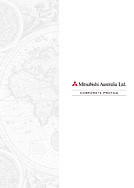
Creating Value through Sustainability
Sustainability issues have significantly evolved over the years and continue to change today. Underpinned by Mitsubishi Corporation's Three Corporate Principles, Mitsubishi Australia is committed to add economic, societal and environmental value by addressing Mitsubishi Corporation’s Materiality and the United Nations' Sustainable Development Goals through our business activities.






